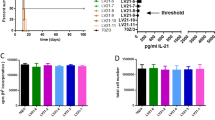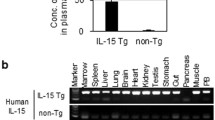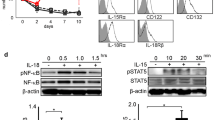Abstract
Human IL-6 gene was transduced into FBL-3 murine erythroleukemia cellsin vitro by calcium phosphate co-participation. After selection in the presence of G418, limiting dilution and biological activity assay, G418 resistant clone that secreted the highest level of IL-6 (225.6 U/ml) was selected out of 24 IL-6-secreting clones. The FBL-3 cells secreting the highest level of IL-6 (FBL-3-IL-6) showed decreased growth potential and clonogenicityin vitro. Inhibition of cell growth and clone formation was found to be closely related to the level of IL-6 secretion. FBL-3-IL-6 cells grew more slowly than wild-type FBL-3 leukemia cells and FBL-3 cells secreting lower level of IL-6 (21.3 U/ml) when inoculated s.c. into C57BL/6 mice. The mice inoculated with FBL-3-IL-6 cells showed prolonged survival period than those inoculated with control leukemia cells. Increased cytotoxic activities of splenic NK and CTL were found in mice inoculated with FBL-3-IL-6 cells. The secretions of IL-2, TNF and GM-CSF from murine splenocytes were also found to be greatly elevated after the inoculation of FBL-3-IL-6 leukemia cells. These data suggested that transduction of IL-6 gene into FBL-3 cells magnificently decreased the tumorigenicity and increased the immunogenicity of the leukemia cells, could induce specific and nonspecific antitumor immune responses. IL-6 gene-modified leukemia cells might be of great interests to be used as vaccine for the treatment of leukemia.
Similar content being viewed by others
References
Anderson WF. Gene therapy for cancer. Hum Gene Ther 1994; 5:1.
Colombo MP, Forni G. Cytokine gene transfer into tumor inhibition and tumor therapy: where are we now? Immunol Today 1994; 15: 48.
Muller JJ, Mclntosh Jk, Jablons DM, et al. Antitumor activity of recombinant interleukin-6 in mice. J Exp Med 1990; 171: 629.
Gallahger G, Stimson WH, Findlay J, et al. Interleukin 6 enhances the induction of human lymphokine activated killer cells. Cancer Immunol Immunother 1990; 31:49.
Givon T, Slavin S, Haran-Ghera N, et al. Antitumor effects of human recombinant interleukin 6 on acute myloid leukemia in mice and in cell cultures. Blood 1992; 79:2392.
Nebber J, Rosenberg SA. Phase I studies of the pharmacokinetic, toxicities and biological effects of interleukin-6 in patients with refractory advanced malignancies. J Immunother 1993; 13:74.
1994; 10(5): 289.
Sun WH, Kreisle RA, Phillips AW, et al.In vivo and in vitro characteristics of interleukin-6-transfected B16 melanoma cells. Cancer Res 1992; 52:5412.
Porgador A, Tzehoval E, Katz A, et al. Interleukin-6 gene transfection into Lewis lung carcinoma tumor cells suppresses the malignant phenotype and confers immunotherapeutics competence against parental metastatic cells. Cancer Res, 1992;52:3679–3686
Ohe Y, Podack ER, Olsen KJ, et al. Interleukin-6 cDNA transfected Lewis lung carcinoma cells show unaltered net tumor growth rate but cause weight loss and shorten survival in syngenic mice. Br J Cancer 1993;67:939–944
Mullen CA, Coale MM, Levy AT, et al. Fibrosarcoma cells transduced with IL-6 gent exhibit reduced tumorigenicity, increased immunogenicity and decreased metastatic potential. Cancer Res 1992; 52: 6020.
Dougherty GJ, Thacker JD, Lavey RS, et al. Inhibitory effect of locally produced and exogenous interleukin-6 on tumor growthin vivo. Cancer Immunol Immunother 1994; 38:339.
Cao X, Zhang W, Gu S, et al. Induction of antitumor immunity and treatment of preestablished tumor by interleukin-6-gene-transfected melanoma cells combined with low-dose interleukin-2. J Cancer Res Clin Oncol 1996; 121:721.
Author information
Authors and Affiliations
Additional information
This work was supported by a grant from the National Natural Science Foundation of China (No.39730420).
This is one of papers of the special issue on gene therapy research (Chin J Cancer Res Vol. 9 No. 4 December, 1997).
Rights and permissions
About this article
Cite this article
Cao, X., Ge, L., Ju, D. et al. Induction of immune response by IL-6 gene-modified leukemia cells. Chin J Cancer Res 10, 9–15 (1998). https://doi.org/10.1007/BF02974652
Accepted:
Issue Date:
DOI: https://doi.org/10.1007/BF02974652




